The State of Musculoskeletal Health
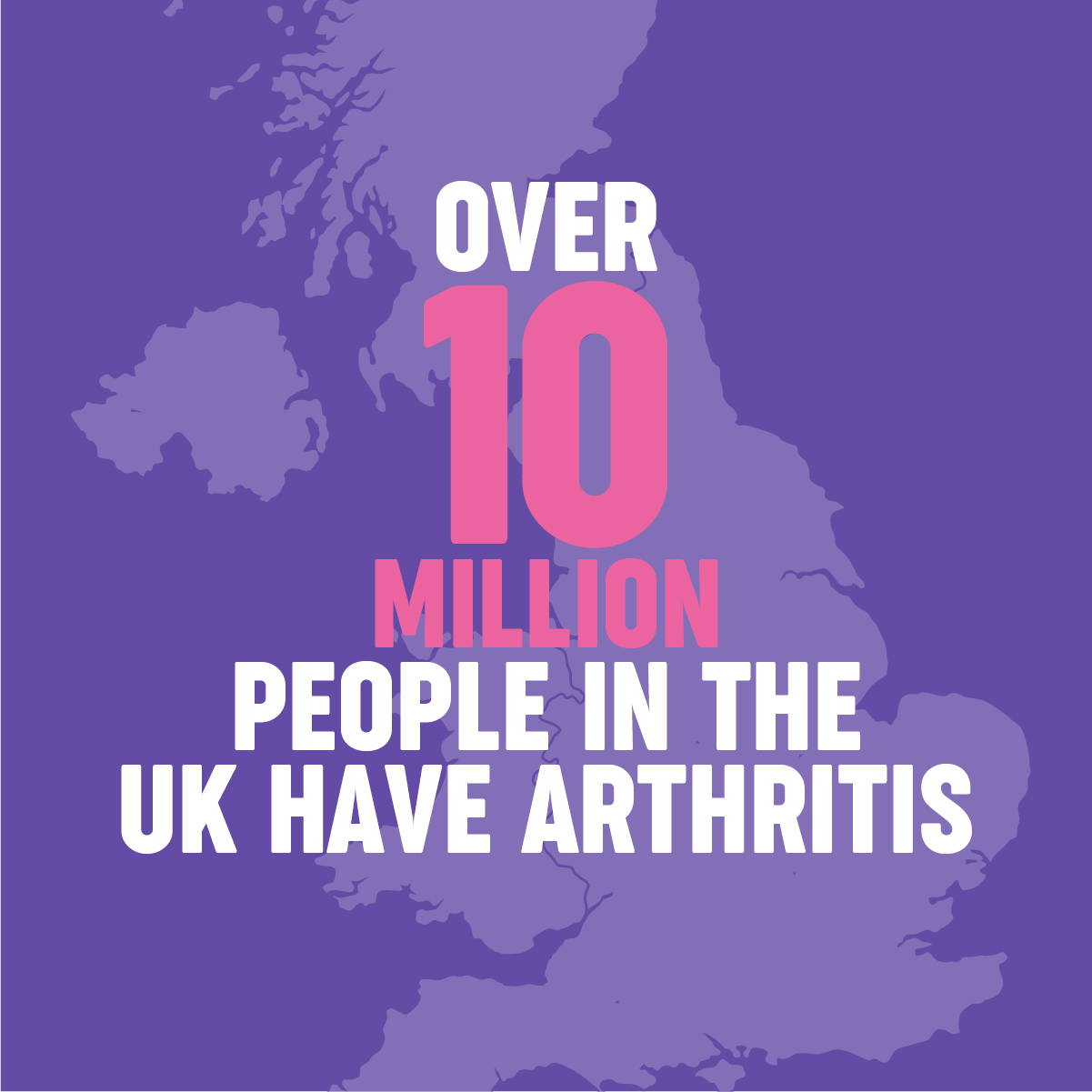
Over 10 million people in the UK have arthritis. That’s one in six people living with the pain, fatigue, immobility, and reduced dexterity it can cause.
The impact is huge as these conditions can intrude on everyday life – affecting the ability to work, care for a family, to move free from pain and live independently.
About the report
The State of Musculoskeletal Health is a collection of the most up-to-date, UK-wide statistics on arthritis and other musculoskeletal (MSK) conditions. Including, how many people have these conditions, the number at risk of developing these conditions, the impact of these on people, health systems and society, and inequalities that can be found within all the topics above.
Download The InfographicsNote: This report was amended on 14th November 2024. An earlier version said that “11,000,000 people in the UK experience low back pain in any given year and of these 11 million, 6.5 million experience severe back pain.” This figure was incorrect owning to an error in the calculation applying prevalence estimates to ONS 2020 mid-year population figures for the UK. We have corrected the calculation error and applied these figures to the latest available ONS 2023 mid-year population figures. The text now reads “9,500,000 people in the UK experience low back pain in any given year and of these 9.5 million, 5.8 million experience severe back pain.
Key findings
How many people are impacted?
Estimates are available of the prevalence of many types of arthritis. 10 million people in the UK have Osteoarthritis (OA), an estimated 5.4 million people have knee OA, and an estimated 3.2 million people have hip OA.
450,000 adults have a recorded diagnosis of Rheumatoid Arthritis, and 190,000 adults are estimated to have Psoriatic Arthritis.
Around a third of the UK population, over 20 million people (20,295,706), live with an MSK condition. 11.6 million women and 8.7 million men, of all ages.
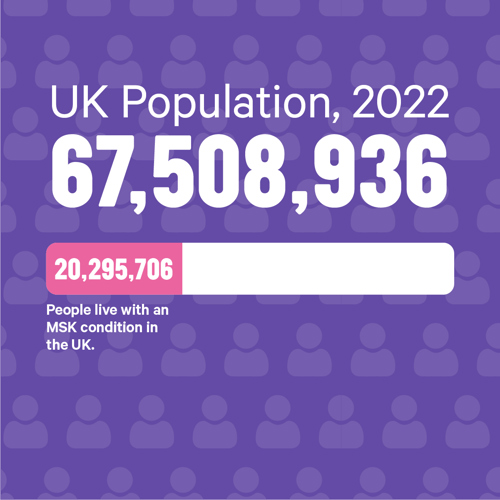
Health inequalities
People who live in the most deprived fifth of society are more likely to report arthritis or a long-term MSK condition compared to those living in the least deprived fifth. Deprivation is also linked to chronic pain, four in ten people (41%) who live in the most deprived fifth of society in England report chronic pain compared to 3 in 10 (30%) in the least deprived quintile.
The prevalence of MSK conditions differs between people from some different ethnic groups, those most likely to report a long-term MSK condition in England are people from a Pakistani ethnic group (20.8%), Black Caribbean ethnic group (18.7%), White British ethnic group (16.8%) and Black African ethnic group (15.4%). Women from Pakistani ethnic backgrounds have the highest prevalence of MSK conditions.
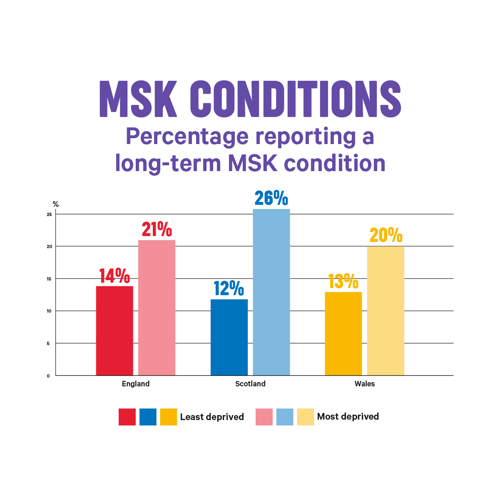
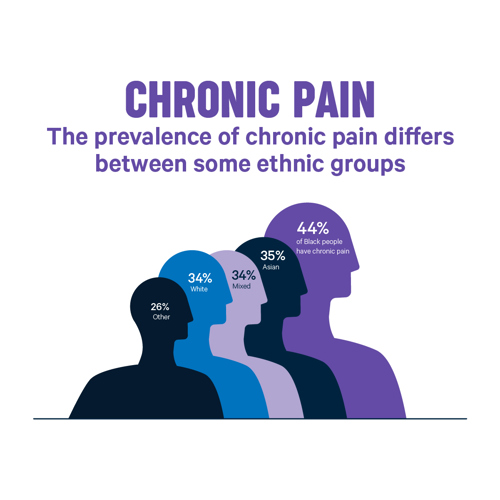
Impact
Having arthritis or another MSK condition impacts a person’s life in numerous ways.
People with arthritis and MSK conditions often take medicines to help manage their symptoms, in 2022-2023 over 30 million prescriptions were dispensed for MSK conditions and joint diseases in England, costing approximately £139 million.
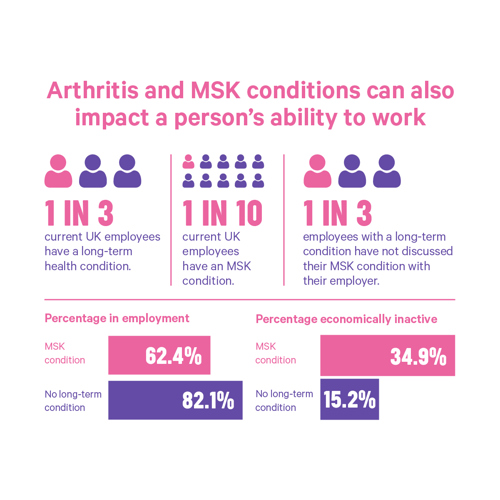
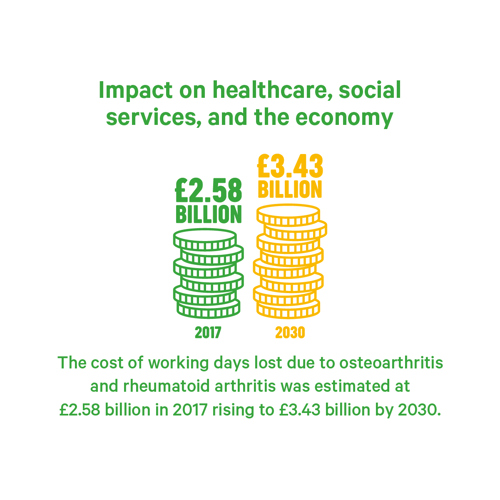
Read the report
Download the full 2024 report (PDF 3,442KB)
Download the full 2024 report in Welsh (PDF, 1,748KB)
Download the accessible version of The State of Musculoskeletal Health 2024 here
We are working hard to make our information accessible to all. If you have any issues reading or accessing this document, please do let us know by emailing creative@versusarthritis.org and we will aim to correct it in the next edition
If you would like to have access to previous versions of the State of Musculoskeletal Health, or if you have any questions, please do get in touch with us by sending an email to data@versusarthritis.org
How to use the report
The report is a resource for healthcare professionals, policy makers, public health leads, people with these conditions, and anyone interested in MSK health. We believe that with the best information you can build awareness, make more informed decisions, feel more confident and ultimately help more people with MSK conditions, such as arthritis.
You might also be interested in...
-
Join our healthcare network community
Sign up to our network to keep up to date on the latest developments in MSK healthcare, development opportunities and resources.
-
Campaign for us
We're working with politicians to take a stand against arthritis. Join us by taking action in our campaigns to end the pain for millions of people.